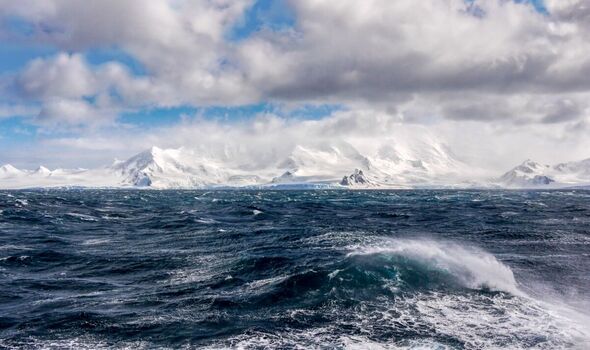Science
Scientists Warn of Global Disaster as Antarctic Current Slows

A significant environmental concern has emerged as scientists reveal that the Antarctic Circumpolar Current (ACC) is undergoing a troubling slowdown. This ocean current, which is currently five times stronger than the Gulf Stream, plays a crucial role in regulating global climate and weather patterns. The ACC encircles Antarctica and is 100 times larger in volume than the Amazon River, making it a vital component of the Earth’s oceanic systems.
Research conducted by the University of Bonn indicates that the ACC is now moving at a pace approximately three times slower than it was 130,000 years ago. This decline raises alarms about potential disruptions to weather patterns and marine ecosystems across the globe. The Gulf Stream, which carries warm water to the UK and influences European climate, is similarly vital, maintaining temperatures significantly higher than those at comparable latitudes elsewhere.
According to Dr. Michael Weber, the lead researcher from the University of Bonn, “The velocity in the second-to-last warm period, roughly 130,000 years ago, was more than three times greater than in the last millennia comprising the current warm period.” This historical context highlights the current alarming trend.
The implications of a weakened ACC are grave. Dr. Bishakhdatta Gayen, an associate professor at the University of Melbourne, emphasizes the potential consequences, stating, “If this current ‘engine’ breaks down, there could be severe consequences, including more climate variability, with greater extremes in certain regions, and accelerated global warming due to a reduction in the ocean’s capacity to act as a carbon sink.”
Impact of the Antarctic Circumpolar Current
The ACC is responsible for transporting cold and warm water currents, along with dissolved carbon and nutrients between the Atlantic, Pacific, and Indian Oceans. It plays an essential role in global ocean circulation. Recent studies have utilized sediment samples from the Scotia Sea, located north of Antarctica, to assess changes in the current’s behavior.
Researchers from the University of Melbourne employed advanced simulations using supercomputers to predict the future of the ACC. Their findings indicate that if current trends continue, rising temperatures could further slow the flow of the ACC by an alarming 20% by the year 2050.
The potential collapse of this critical oceanic current raises significant concerns about its effects on global weather patterns and the environment. As climate change continues to exert pressure on natural systems, the interconnectedness of ocean currents underscores the importance of addressing climate issues on a global scale. Scientists are urging immediate action to mitigate the effects of climate change and ensure the health of the planet’s oceanic systems.
The research underscores the delicate balance of our climate and the need for global cooperation in addressing the pressing challenges posed by climate change. As the situation develops, it remains essential for policymakers and the public to remain informed about the ongoing changes in our oceans and their far-reaching implications.
-

 World3 days ago
World3 days agoCoronation Street’s Shocking Murder Twist Reveals Family Secrets
-

 Entertainment4 months ago
Entertainment4 months agoKate Garraway Sells £2 Million Home Amid Financial Struggles
-

 Entertainment3 months ago
Entertainment3 months agoAnn Ming Reflects on ITV’s ‘I Fought the Law’ Drama
-

 Health3 months ago
Health3 months agoKatie Price Faces New Health Concerns After Cancer Symptoms Resurface
-

 Entertainment3 weeks ago
Entertainment3 weeks agoCoronation Street Fans React as Todd Faces Heartbreaking Choice
-

 World4 weeks ago
World4 weeks agoBailey Announces Heartbreaking Split from Rebecca After Reunion
-

 Entertainment6 days ago
Entertainment6 days agoTwo Stars Evicted from I’m A Celebrity Just Days Before Finale
-

 World6 days ago
World6 days agoKevin Sinfield Exceeds Fundraising Goal Ahead of Final Marathons
-

 Entertainment3 months ago
Entertainment3 months agoCoronation Street’s Carl Webster Faces Trouble with New Affairs
-

 Entertainment3 months ago
Entertainment3 months agoWhere is Tinder Swindler Simon Leviev? Latest Updates Revealed
-

 Entertainment4 months ago
Entertainment4 months agoMarkiplier Addresses AI Controversy During Livestream Response
-

 Science2 months ago
Science2 months agoBrian Cox Addresses Claims of Alien Probe in 3I/ATLAS Discovery





















